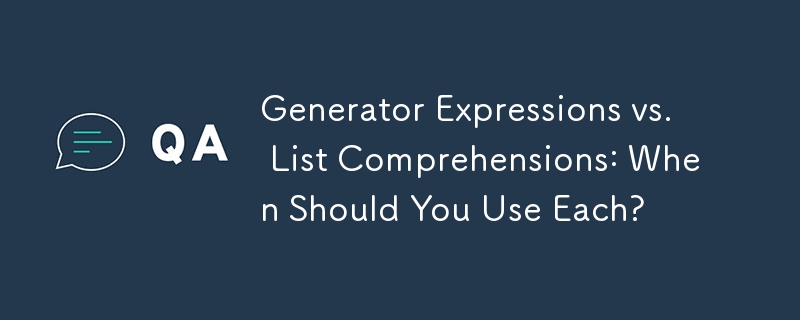 Backend Development
Backend Development
 Python Tutorial
Python Tutorial
 Generator Expressions vs. List Comprehensions: When Should You Use Each?
Generator Expressions vs. List Comprehensions: When Should You Use Each?
Generator Expressions vs. List Comprehensions: When Should You Use Each?

Generator Expressions vs. List Comprehensions: Understanding the Differences
When working with Python, developers often have the choice between using generator expressions and list comprehensions to achieve the same result. While both approaches offer efficient ways of creating new lists, each has its unique advantages and disadvantages.
When to Use Generator Expressions
Generator expressions are preferred when you only need to iterate over a sequence once. They are more memory-efficient than list comprehensions because they do not store the entire new list in memory. Instead, they yield one element at a time, making them particularly useful for large datasets.
Example:
(x*2 for x in range(256))
This expression generates a sequence of numbers from 0 to 511 that are doubled. Since it is a generator expression, it will yield values only when iterated over, conserving memory.
When to Use List Comprehensions
List comprehensions are more appropriate when you plan to iterate over the new list multiple times or need access to list-specific methods. Unlike generators, list comprehensions create an immutable list that is stored in memory. This makes them suitable for situations where you need random access to elements or wish to apply methods like slicing or concatenation.
Example:
[x*2 for x in range(256)]
This comprehension creates a new list of numbers from 0 to 511 that are doubled. The list is stored in memory, allowing for easy access to its elements and methods.
General Performance Considerations
In most cases, the performance difference between generator expressions and list comprehensions is negligible. However, if memory conservation is a major concern or if you are dealing with very large datasets, generator expressions are generally preferred.
Conclusion
Understanding the distinctions between generator expressions and list comprehensions is crucial for selecting the most appropriate approach in different scenarios. Generator expressions offer memory efficiency for single-pass iteration, while list comprehensions provide convenient access and manipulation of the created list. By leveraging the appropriate choice, developers can optimize their Python code for both performance and flexibility.
The above is the detailed content of Generator Expressions vs. List Comprehensions: When Should You Use Each?. For more information, please follow other related articles on the PHP Chinese website!

Hot AI Tools

Undresser.AI Undress
AI-powered app for creating realistic nude photos

AI Clothes Remover
Online AI tool for removing clothes from photos.

Undress AI Tool
Undress images for free

Clothoff.io
AI clothes remover

Video Face Swap
Swap faces in any video effortlessly with our completely free AI face swap tool!

Hot Article

Hot Tools

Notepad++7.3.1
Easy-to-use and free code editor

SublimeText3 Chinese version
Chinese version, very easy to use

Zend Studio 13.0.1
Powerful PHP integrated development environment

Dreamweaver CS6
Visual web development tools

SublimeText3 Mac version
God-level code editing software (SublimeText3)

Hot Topics
 How to solve the permissions problem encountered when viewing Python version in Linux terminal?
Apr 01, 2025 pm 05:09 PM
How to solve the permissions problem encountered when viewing Python version in Linux terminal?
Apr 01, 2025 pm 05:09 PM
Solution to permission issues when viewing Python version in Linux terminal When you try to view Python version in Linux terminal, enter python...
 How to avoid being detected by the browser when using Fiddler Everywhere for man-in-the-middle reading?
Apr 02, 2025 am 07:15 AM
How to avoid being detected by the browser when using Fiddler Everywhere for man-in-the-middle reading?
Apr 02, 2025 am 07:15 AM
How to avoid being detected when using FiddlerEverywhere for man-in-the-middle readings When you use FiddlerEverywhere...
 How to teach computer novice programming basics in project and problem-driven methods within 10 hours?
Apr 02, 2025 am 07:18 AM
How to teach computer novice programming basics in project and problem-driven methods within 10 hours?
Apr 02, 2025 am 07:18 AM
How to teach computer novice programming basics within 10 hours? If you only have 10 hours to teach computer novice some programming knowledge, what would you choose to teach...
 How to efficiently copy the entire column of one DataFrame into another DataFrame with different structures in Python?
Apr 01, 2025 pm 11:15 PM
How to efficiently copy the entire column of one DataFrame into another DataFrame with different structures in Python?
Apr 01, 2025 pm 11:15 PM
When using Python's pandas library, how to copy whole columns between two DataFrames with different structures is a common problem. Suppose we have two Dats...
 How does Uvicorn continuously listen for HTTP requests without serving_forever()?
Apr 01, 2025 pm 10:51 PM
How does Uvicorn continuously listen for HTTP requests without serving_forever()?
Apr 01, 2025 pm 10:51 PM
How does Uvicorn continuously listen for HTTP requests? Uvicorn is a lightweight web server based on ASGI. One of its core functions is to listen for HTTP requests and proceed...
 How to handle comma-separated list query parameters in FastAPI?
Apr 02, 2025 am 06:51 AM
How to handle comma-separated list query parameters in FastAPI?
Apr 02, 2025 am 06:51 AM
Fastapi ...
 How to solve permission issues when using python --version command in Linux terminal?
Apr 02, 2025 am 06:36 AM
How to solve permission issues when using python --version command in Linux terminal?
Apr 02, 2025 am 06:36 AM
Using python in Linux terminal...
 How to get news data bypassing Investing.com's anti-crawler mechanism?
Apr 02, 2025 am 07:03 AM
How to get news data bypassing Investing.com's anti-crawler mechanism?
Apr 02, 2025 am 07:03 AM
Understanding the anti-crawling strategy of Investing.com Many people often try to crawl news data from Investing.com (https://cn.investing.com/news/latest-news)...





